Brake Rotor - Front - LH (Measure Runout)
Correction code 33010100 0.35 NOTE: Unless otherwise explicitly stated in the procedure, the above correction code and FRT reflect all of the work required to perform this procedure, including the linked procedures. Do not stack correction codes unless explicitly told to do so. NOTE: See Flat Rate Times to learn more about FRTs and how they are created. To provide feedback on FRT values, email ServiceManualFeedback@tesla.com. NOTE: See Personal Protection to make sure proper PPE is worn when performing the below procedure.
Procedure
- Open the LH front door and lower the LH front window.
-
Apply the brake pedal depressor.
NoteVerify the brake pedal is fully pressed to avoid wheels from spinning.
- Raise and support the vehicle on a 2 post lift. See Raise Vehicle - 2 Post Lift.
- Remove the LH front wheel. See Wheel Assembly (Remove and Install).
-
If installed, remove and discard the
bolt that attaches the front rotor to the knuckle assembly.
NoteSome vehicles may not have this fastener installed from the factory.TIpUse of the following tool(s) is recommended:
- 13 mm socket
NoteDiscard the bolt after removal. -
Install the brake rotor run out
clamping plate onto the front rotor.
 100 Nm (73.7 lbs-ft)TIpUse of the following tool(s) is recommended:
100 Nm (73.7 lbs-ft)TIpUse of the following tool(s) is recommended:- 21 mm deep socket
Notex5 nutsNoteThis simulates the wheel being installed, thus preventing inaccurate measurements. -
Install the brake rotor run out flex
bar onto the front tie rod nut and setup for reading.
-
Measure 10 mm inward from the front
rotor end and align digital indicator. Press the indicator rod and zero
measurement.
NoteMake sure the indicator rod is pressed to allow travel in both directions and does not bottom out.
-
Mark the top center of the front rotor
to identify starting point.
-
Slowly rotate the front rotor 1 full
revolution.
NoteRecord the highest positive and lowest negative values as shown on the digital indicator as the rotation is completed.NoteThe total runout is the difference between the highest positive and lowest negative values and must not exceed 0.050 mm. If the total runout exceeds 0.050 mm, the brake rotor must be replaced due to excessive runout.
-
Measure 25 mm inward from the front
rotor end and align digital indicator. Press the indicator rod and zero
measurement.
NoteMake sure the indicator rod is pressed to allow travel in both directions and does not bottom out.
-
Slowly rotate the front rotor 1 full
revolution.
NoteRecord the highest positive and lowest negative values as shown on the digital indicator as the rotation is completed.NoteThe total runout is the difference between the highest positive and lowest negative values and must not exceed 0.050 mm. If the total runout exceeds 0.050 mm, the brake rotor must be replaced due to excessive runout.
-
Measure 40 mm inward from the front
rotor end and align digital indicator. Press the indicator rod and zero
measurement.
NoteMake sure the indicator rod is pressed to allow travel in both directions and does not bottom out.
-
Slowly rotate the front rotor 1 full
revolution.
NoteRecord the highest positive and lowest negative values as shown on the digital indicator as the rotation is completed.NoteThe total runout is the difference between the highest positive and lowest negative values and must not exceed 0.050 mm. If the total runout exceeds 0.050 mm, the brake rotor must be replaced due to excessive runout.
-
Remove the brake rotor run out flex
bar from the front tie rod nut.
-
Lower vehicle to suitable height and
install the brake pedal depressor.
- Raise the vehicle partially to a comfortable working height.
- Remove the brake rotor runout clamping plate from the front rotor.
- Install the LH front wheel. See Wheel Assembly (Remove and Install).
-
Remove the vehicle from the
lift.
NoteRemove the air suspension from "Jack Mode."
- Remove the pedal depressor from the vehicle.